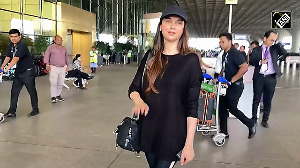Today's structures for global governance remain driven by the power equations of the past...
As the world's largest democracy, India supports popular aspirations for a democratic and pluralistic order...
India's strategic partnership with Africa is premised on making the people of Africa its primary beneficiaries...
Prime Minister Manmohan Singh outlines the relevance of the Non-Alignment Movement in today's emerging geopolitics, at the XVI Summit of the organisation in Tehran, Iran:
I congratulate His Excellency Dr. Mahmoud Ahmadinejad, President of the Islamic Republic of Iran, on assuming the Chairmanship of the Non-Aligned Movement. Mr. Chairman, India will extend its full cooperation to Iran as it leads the Movement over the next three years.
I also express my appreciation to Egypt for its stewardship of the Movement since the last Summit, even though Egypt has been in the midst of profound domestic change.
Mr Chairman, the Non-Aligned Movement, representing the large majority of humankind, has been a powerful force for the promotion of global peace, security and development.
Our shared objectives of working together to preserve our strategic space, ensure our social and economic development and strive for a more just and equitable world order remain as true and relevant today as they were in the past.
Mr Chairman, your chosen theme for our Summit -- Lasting Peace through Joint Global Governance -- is timely.
Today's structures for global governance remain driven by the power equations of the past. It is not surprising that they have proved inadequate in dealing with the economic and political crises of our present.
The deficit in global governance is perhaps most stark in the sphere of international peace and security and in restoring just and fair economic and financial mechanisms.
The West Asian and North African region is undergoing profound change. As the world's largest democracy, India supports popular aspirations for a democratic and pluralistic order. Nevertheless, such transformations cannot be prompted by external intervention, which exacerbate the suffering of ordinary citizens.
The deteriorating situation in Syria is a matter of particular concern. Our Movement should take a stand on the issue in keeping with universally accepted principles. We should urge all parties to recommit themselves to resolving the crisis peacefully through a Syrian-led inclusive political process that can meet the legitimate aspirations of all Syrian citizens.
The Non-Aligned Movement has always championed the cause of the Palestinian people. Today, we should renew our pledge to support an early resolution of the Palestinian question, so that the long suffering people of Palestine can live in peace and dignity in a state of their own.
Mr Chairman, in the past, individually we may have had little economic and military clout but the collective voice and reasoned interventions of our movement commanded respect and credibility. That voice should again find true expression on a variety of issues.
We need new instruments of global governance to confront cross-cutting and trans-national challenges through coordinated global action.
These include international terrorism, proliferation of weapons of mass destruction, the menace of maritime piracy, the growing threat to cyber security and the growing challenge of pursuing ecologically sustainable development while ensuring energy, water and food security.
Our Movement should take the lead in building global governance structures that are representative, credible and effective. It is my sincere hope that the Movement can agree on action to reform institutions such as the United Nations Security Council, the World Bank and the IMF.
Existing problems cannot be solved effectively without a greater voice for developing countries on issues such as global trade, finance and investment.
Developing countries can be drivers of global growth. International financial institutions should therefore be encouraged to fund infrastructure development in the developing world in innovative ways.
We should also urge that the current economic crisis should not lead to a dilution of development assistance flows from the developed world.
While we come together on the international stage, it is equally important for us to collaborate among ourselves in tackling problems and developing solutions that are best suited to our own circumstances.
For example, the developing world is rich in renewable sources of energy like solar power. We should use our financial and intellectual resources to develop renewable energy technologies that get less attention in the industrialised world where the resource base is different.
Adoption of these technologies will also enable us to contribute to preservation of the environment. We can learn from each other in this effort.
Similarly, food security is a basic problem for many of our countries. Excessive speculation, structural bottlenecks and lack of coordination are fuelling food inflation at the global level. Our Movement should push for effective food policy coordination and cooperation at the global level in areas such as agricultural productivity, weather forecasting and research and development.
Perhaps most relevant for us is to focus on investing in the knowledge economy and building our human resources. When faced with our unique developmental challenges, our youth have the creativity and energy to find solutions that are innovative, frugal and affordable.
However, we need to provide them skills and equip them to find productive employment in a rapidly changing and inter-connected global economy. India would be happy to contribute to a NAM initiative on skill development, particularly focused on the knowledge economy.
Mr Chairman, the African continent provided the intellectual wellspring for many of the leaders of the Non Aligned Movement. The growth of NAM and decolonization in Africa progressed almost hand in hand. Africa therefore has a special place in NAM.
India's own strategic partnership with Africa is premised on making the people of Africa its primary beneficiaries. The India-Africa Forum Summit thus provides for an ambitious programme of pan-African institution-building to enhance our multi-faceted cooperation. I invite interested NAM members to work with us in areas of priority to Africa.
Nearly two decades ago, India embarked on a "Look East" policy in an endeavour to learn and benefit from and contribute to the evolution of a new Asian economic community to our East.
However, the progress, prosperity, well being, political stability and plurality of the Asia to our West has always been of equal historical and civilisational significance for us. A West Asian region that can realize its full potential, live in peace and harmony and join the comity of democratic and plural societies will contribute greatly to human progress and peace in the 21st Century.
Mr Chairman, let me conclude by thanking you for this opportunity to renew our Movement's collective endeavour for peace and prosperity which is needed in our troubled planet today. Even as our members have differing views on different issues, our sense of common destiny and solidarity unites us and gives us common purpose. I am certain that our deliberations will be helpful in restoring this historic Movement to its rightful place on the international stage.
I thank you.





